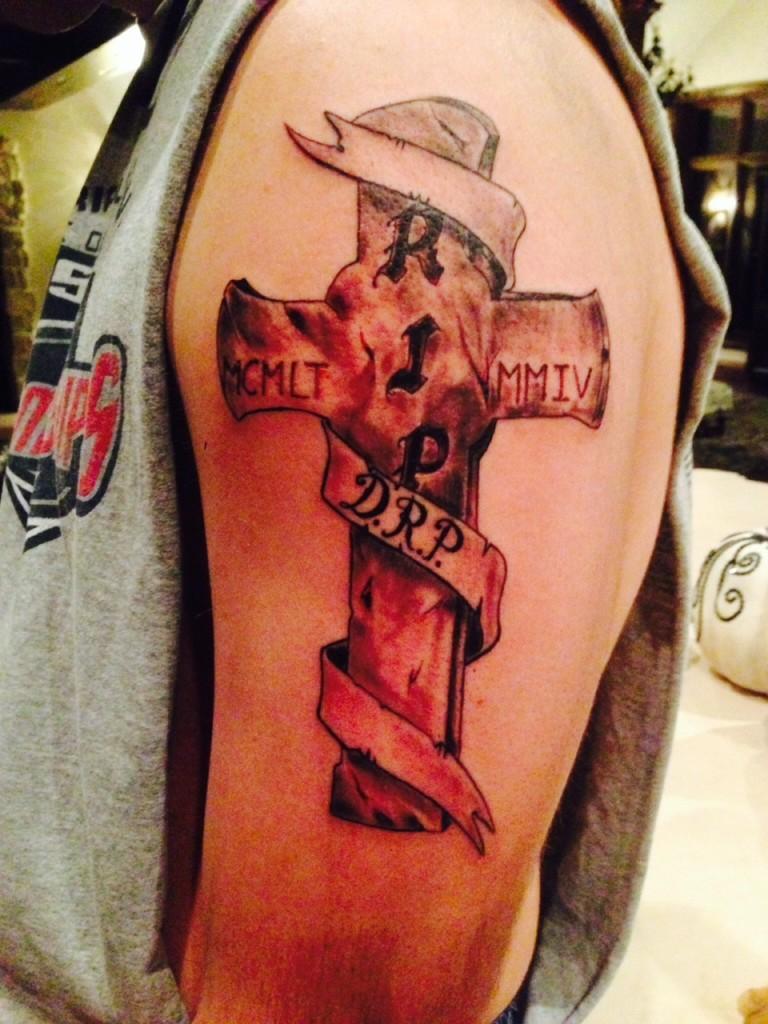INKED: You’re 18. Should You Get a Tattoo?
As tattoos start to appear on the bodies of Regis Jesuit students, people had some different opinions.
One Regis Jesuit Student’s New Tattoo.
The buzzing sound of the tattoo gun echoed throughout White Lotus. Customers enter the tattoo shop daily to temporarily sit in the black leather chairs, but to permanently mark their bodies. Mike McGinley, White Lotus employee, greets those who walk through the door, standing at the front desk, body marked with practically no blank space. McGinley often greets young teenagers with tons of blank space eager to fill it up, yet some would have to disagree with the timing of teenager’s tattoos.
Because more and more teenagers are coming of age and able to mark themselves up without parental consent, people have started wondering: is it too early for this kind of body-altering work?
Despite his young age and people’s expectations of irrational reasons to get a tattoo, one Regis Jesuit student was very happy with his decision. “I have always wanted to get a tattoo, but I think there needs to be a reason to get it,” he said. This student decided to get a tattoo in honor of his father’s death. And when asked if it was an impulsive decision, he simply stated, “Not at all. I have been thinking about it for almost 6 years now.”
McGinley got his first tattoo at just 16 years old. As he described the tattoo on his arm, it was clear to see that it was more than ink on his arm; it was a part of his story. His first tattoo was to honor his late grandmother. The scripture read at her funeral was recited on his arm forever. Although he does not regret getting it for his grandma, he wishes he would have gotten something to symbolize it, rather than the actual words. Getting a lot of words tattooed is not as pleasing to the eye as a picture and as time goes on, you begin to regret those words because you read them over and over. “A picture speaks a 1000 words and there is no need to get 1000 words tattooed on your body if you can get a picture that says the same thing,” he stated.
Chris Walsweer, Boys Division Social Studies Department Chair, who received his masters in psychology focused on history and meaning of tattoos from Regis University, also had some opinions on teenagers getting tattoos.
Walsweer knew it would be hypocritical if he opposed the idea, because he got several tattoos at that age, his first at just 16. Yet he strongly discourages students from getting tattoos, especially young women, until they are old enough to have really thought about it.
“I wish I had that space to do a good one,” he said after stating that his first is his favorite, but some of his other early tattoos are not as pleasing. “The ones I got at that age are horrible,” he joked.
Willing to talk about tattoos in a Diversity Day session last year, RJ students signed up as quickly as possible for this popular topic. And although Walsweer wasn’t given enough time to really tell his audience all that he wanted to, he dove into his studies as deep as he could. Students left his session with a much greater appreciation for tattoos because of what is explained through the ink.
During his studies, Walsweer focused on Sigmund Freud and Carl Jung’s psychology of symbols and applied it to tattoos. “[Sigmund Freud and Carl Jung] are pretty influential in my life academically,” Walsweer said.
Walsweer said that there is a psychological reason for permanently marking one’s body, whether or not one is aware of that reason.
“Very often they are about healing, friendship, and belonging. So those are the three really main reasons. I’ve seen the Regis Jesuit cross, its about belonging, fraternity, sorority,” Walsweer stated.
“As a symbol and a behavior, the tattoo has power,” Kirby Farrell, author of A Swim in Denial, stated. Tattoos have the power to express oneself in ways they couldn’t do otherwise. Tattoos have the power to boost self-esteem. And because humans are always in search for something to enhance themselves, people will always tattoo.
During his session, Walsweer not only talked about the psychology of tattoos, but also some popular styles of tattoos. According to the blog, Skin Deep in Art, and Walsweer’s session, some of the most popular style of tattoos include: tribal, black and grey, prison, traditional American, biochemical, and Asian. (Some of Walsweer’s favorites are pictured below.)
Although Walsweer wishes he had more room for better tattoos, he has never gotten a tattoo removed. Some people are so regretful that they decide to look into the tattoo removal process.
White Lotus artist, McGinley, described the lengthy process of tattoo removal by stating: “You go through the pain of a tattoo, then removal, and then many people tattoo over the space again… its expensive and painful.” He spoke of two methods of removal that he was aware of: laser removal or tattooing peroxide over the tattoo. “I’ve heard it’s even more painful and expensive than being tattooed.”
One anonymous public school student talked about her experience with tattoo removal. “I was really sneaky (to get the tattoo) and I didn’t think through my decision before getting it. Even though the entire school knew about it, my mom still had no idea.” Yet when her mom did find out, this senior student was told to remove the tattoo immediately.
Discovery Health’s article How Tattoo Removal Works discussed the various methods of tattoo removal. Three methods the article listed were dermabrasion, cryosurgery, and excision. In extreme cases, involving large tattoo removal, a skin graft may even be necessary. Dermabrasion involves the skin being “sanded” to remove skin’s surface and middle layers. Cryosurgery involves the area being frozen before removal. And excision is when the tattoo is removed surgically with a scalpel and the wound closed with stitches.
Although there is a reason behind every tattoo, some still believe young teenagers should not get a tattoo until more thought has gone into it. With some of the consequences of getting tattoos without consent and some examples of regret, teenagers should not get a tattoo until they have thought about every single aspect that comes along when getting a tattoo. Art or not, it can either always be there for everyone to see or a painful and expensive memory of a mistake.







